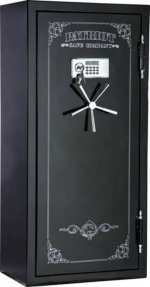If you're looking for a relatively high level of security and not just a false sense of comfort, if you can, spend the extra dollars on a quality safe. Most safe manufacturers carry quality safes, but some of the factors that you may wish to look at are:
Check with the insurance company that handles your home insurance. They may have recommendations for safes that will allow you to pay a reduced insurance premium.
Make certain that your safe, if not built into a wall or floor, is:
Too heavy for 2 persons to carry away without the use of a trolley.
If very heavy, make certain that the floor is stress rated to hold the load.
Combination/key or pin pad/key together are best. The pin pad should be able to be coded to at least 6 digits.
Fire proof - not just fire resistant - to 1,100 degrees Fahrenheit for at least 1/2 hour. House fires can reach that temperature in minutes and even rooms that are not on fire can hit 300 degrees Fahrenheit.
If the fire is hot enough many of the smaller safes, though they are fire proof for an hour or so, may reach an internal temperature where paper will spontaneously ignite (around 220 degrees Celsius) or plastic components may melt.
Gun safes, such as for small firearms, generally have a higher fire rating.
If the safe isn't air tight, you may wish to consider keeping items like hard disks, flash drives, papers, etc. in an airtight container within the safe to reduce the risk of smoke damage or water damage when the fire department hoses down the house.
If possible, don't keep the safe near potential flash points such as in a closet with combustible cleansing agents.
You can sometimes pick up good safes at a good price at local auctions. I bought two large office safes for $50 at auction. Then add on the cost of piano movers to transport the safes (they each weighed 400 kg.) plus the cost of a locksmith to change the combination, unless the instructions were kept and you can do it yourself. If a key is required, make certain that the key is included.
Keep additional copies of important items that you don't require frequently in a safe deposit box.




